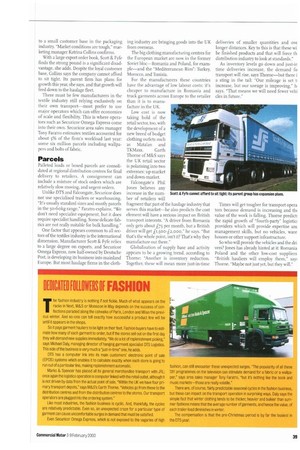DEDICATED FOLOWERS OF FASHION
Page 41

If you've noticed an error in this article please click here to report it so we can fix it.
The fashion industry is nothing if not fickle. Much of what appears on the racks in Next, M&S or Monsoon in May depends on the success of confections paraded along the catwalks of Paris, London and Milan the previous winter. And no-ore can tell exactly how successful a product line will be until it appears in the shops.
So it pays garment hauliers to be light on their feet. Fashion buyers have to estimate how many of each garment to order, but if the stores sell out on the first day they will demand new supplies immediately. We do a lot of replenishment picking," says Michael Daly, managing director of hanging garment specialist DTS Logistics. This side of the business is very much a "just-in-time" one, he adds.
DTS has a computer link into its main customers' electronic point of sale (EPOS) systems which enables it to calculate exactly when each store is going to run out of a particular line, making replenishment automatic.
Marks & Spencer has placed all as general merchandise transport with ,1RL; once again the logstics operation is computer linked with the retail outlet, although it is not driven by data from the actual point of sale. "Within the UK we have four primary transport depots," says M&S's Garth Thorne. "Vehicles go from these to the distribution centres and from the distribution centres to the stores. Our transport operators are plugged into the ordering system."
Like most industries, the fashion business is cyclic. And, thankfully, the cycles are relatively predictable. Even so, an unexpected craze for a particular type of garment can cause uncomfortable surges in demand that must be satisfied.
Even Securicor Omega Express, which is not exposed to the vagaries of high fashion, can still encounter these unexpected surges. "The popularity of all these DIY programmes on the television can stimulate demand for a fabric or a wallpaper," says area sales manager Tony Faratro, "but it's nothing like the book and music markets—those are really volatile."
There are, of course, fairly predictable seasonal cycles in the fashion business, but these can impact on the transport operation in surprising ways. Daly says the simple fact that winter clothing tends to be thicker, heavier and bulkier than summer fashions means that the average number of garments, and hence the value, of each trailer-load diminishes in winter.
The compensation is that the pre-Christmas period is by far the busiest in the DTS year




































































































